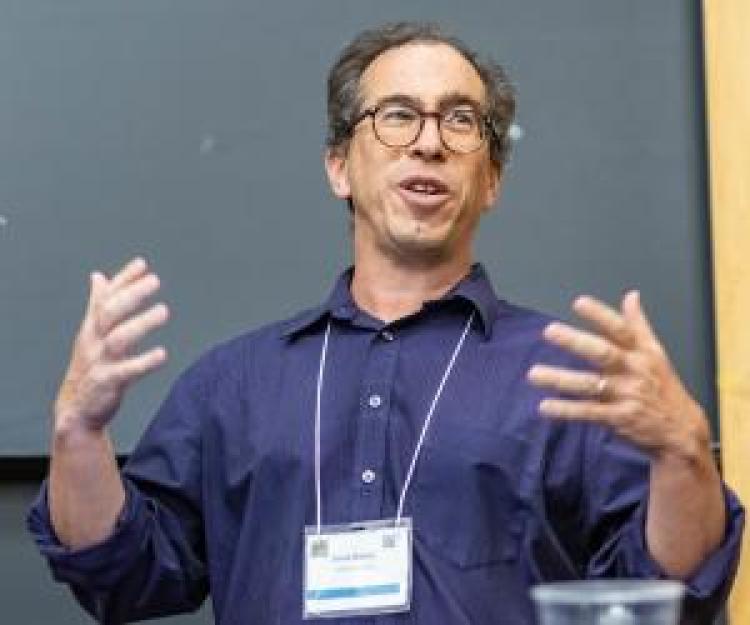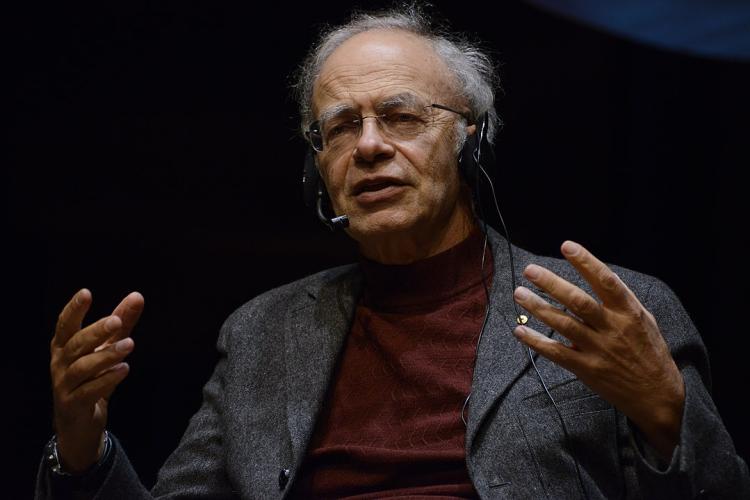Philosopher’s challenge aims to help students and the world’s poorest
If CU Boulder Professor David Boonin raises $10,000 for COVID-19 education and prevention, noted philosopher Peter Singer will Zoom into Boonin’s summer class
Update as of May 12: Boonin’s effort has raised $6,560 toward the goal of raising $10,000 and getting Peter Singer to do a Zoom session with our summer seminar students. An anonymous donor has offered to contribute $2,500 if the efforts of other supporters raises $7,500—thus reaching the goal.
Philosophy Professor David Boonin is trying to raise $10,000 in COVID-19 prevention for the world’s poorest people, and if he succeeds, his students this summer will get a special in-class appearance (via Zoom) of “the world’s most famous living philosopher.”

David Boonin
The potential guest is Princeton’s Peter Singer, renowned philosopher, sought-after speaker and author of the groundbreaking book, Animal Liberation.
Boonin, who directs the Colorado Summer Seminar in Philosophy at the University of Colorado Boulder, wanted to ask Singer to participate in one of the seminar’s sessions. The hurdle: Singer charges a hefty speaking fee, which Singer then spends on charity.
Landing Singer seemed “out of the question,” Boonin said.
“But then it occurred to me: instead of offering him a large speaker fee that I knew he would just donate to charity anyhow, why not offer him no speaker fee at all and instead offer to try to raise a lot of money and get it donated to a cause of his choosing by other people?”
Boonin figured, correctly, that the idea would appeal to Singer, though he’s “a bit daunted—though not at all surprised!—that he set the fundraising bar pretty high.”
Singer specified that the $10,000 would go to Development Media International (DMI), a charity recommended by The Life You Can Save and one of GiveWell’s Standout Charities.
As reported by Daily Nous, a website reporting news about and for philosophers, Singer explained that choice this way: DMI “is uniquely placed to reduce the impact of COVID-19 in some of the world’s poorest countries.”
DMI specializes in the use of the media to promote healthy practices in low-income countries, working in Burkina Faso, Côte d’Ivoire, Ethiopia, Madagascar, Malawi, Mozambique, Tanzania, Uganda and Zambia, Singer said, adding that the nonprofit has strong relations not only with the media in those countries, but also with the government health departments.
For many of the faculty who teach for the seminar, including me, it’s a highlight of our year, and for many of the students who attend, it becomes a highlight of their college experience."
In the current crisis, Singer said, everyone knows how important it is to provide citizens with information about how to stay safe and reduce the chances of getting the novel coronavirus. People in affluent countries are bombarded with media providing this information, he added.
In the countries in which DMI operates, however, and especially in rural areas, information sources are scarce. “Moreover, when people in these regions do become seriously ill with COVID-19, most are unable to get hospital care. Hence prevention is by far the most cost-effective means of saving lives and DMI is, in my opinion, the organization best placed to do this,” Singer said.
Singer’s challenge to Boonin supports two good causes: philosophical education and public health in developing countries. Those interested in learning how to contribute to the campaign should email Boonin at david.boonin@colorado.edu.
Boonin noted that the summer seminar brings in a select group of advanced undergraduates from around the country and abroad who are considering going to graduate school in philosophy and offers them a kind of intensive three-week, team-taught, graduate-level philosophy boot camp.
“For many of the faculty who teach for the seminar, including me, it’s a highlight of our year, and for many of the students who attend, it becomes a highlight of their college experience,” Boonin said.

Peter Singer
Much of the value of the seminar in typical years arises from the fact that these students come from all over, often from small schools where they might be one of the only students with an interest in philosophy, and then get to spend three weeks in Boulder hanging out with other students with similar interests not just in the class, but in the dorms, over meals, on weekend hikes and so on, he said.
Although this year’s seminar will be run remotely, Boonin is confident that the class experience will be first rate. Still, he added, “I felt bad about the fact that they’ll be missing out on a lot of the extracurricular benefits that the students in previous summers have been able to enjoy. So I wanted to think about ways to try make up for that” while using Zoom.
Singer fits the bill.
Singer’s 1975 book Animal Liberation is widely recognized as the founding document of the modern movement to combat the widespread unethical treatment of non-human animals, Boonin observed, adding:
“The number of vegetarian and vegan options in stores and restaurants that many people now take for granted, for example, would have been unthinkable in 1975. And while Singer obviously doesn’t deserve all the credit for the revolution that has occurred, and is continuing to occur, in our thinking about the moral status of non-human animals, he almost certainly deserves more credit for this than anyone else.”
Boonin noted that in a series of writings beginning with Singer’s 1971 article “Famine, Affluence, and Morality,” and continuing through the publication of his 2009 book The Life You Can Save, Singer has been the “leading defender of, and advocate for, the view that those of us who are fortunate to live in relatively affluent societies have a moral obligation to do more than we are currently doing to help those who live in poverty elsewhere.”
In this context, Boonin said, Singer is also recognized as the founding father of what has become known as the “effective altruism” movement: a movement designed to encourage more rational and evidence-based decision making about where to donate money.

